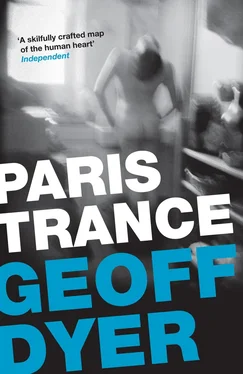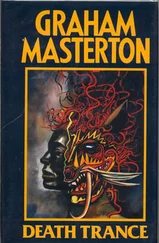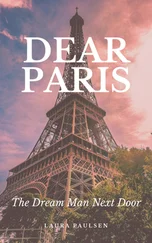‘Breasts,’ she said.
‘Breasts.’ He touched her breasts and kissed her on the mouth.
‘Lips,’ she said.
‘Lips,’ he said.
‘Tongue.’
‘Tongue.’
‘Ear.’ He kissed her ear, whispering the word in her ear.
‘Neck,’ she said, and he touched her neck as softly as he could.
‘Hair,’ she said. Her hair was falling over his face. He gathered it loosely in his hand and let it run through his fingers.
‘Hair,’ he said, gathering it in his fist.
‘Hair.’
He pulled her hair, gently, then harder until her head was pulled backwards.
‘Hair.’
‘Hair,’ he said, threading it with starlight.
Afterwards they lay side by side, staring up at the star-drenched night. Neither of them was able to recognize the constellations. To attempt to arrange the swathe of stars into patterns, designs, shapes or outlines of objects was to diminish them, to scale down the immensity of what was seen and render it manageable. Even to look at them through your own eyes, to seek to hold the view in your head seemed compromising, belittling.
If only we could see without being — then we could be what we see.
‘How many stars do you think there are up there?’ said Nicole.
‘An astronomical number.’
They watched for shooting stars, taking it in turns to call out: ‘There’s one!’ ‘Look, there!’
‘I’ve never been happier in my life,’ said Luke.
‘Nor have I.’
‘And I never will be happier.’
‘How do you know?’
‘There’s a ceiling. A limit.’
‘Funny to say that now, now that there is no ceiling to be seen.’
‘You don’t think those stars are a ceiling?’
They lay still. A satellite skimmed the earth. Passing, passing.
‘What are you thinking now?’ said Nicole.
‘I’m wondering if it’s possible that happiness could become unbearable,’ he said. ‘I think I can imagine it, not being able to bear happiness any more.’
Nicole said nothing. He moved to kiss her. Her face was wet against his lips.
To see without being, to be what is seen. .
A few days before they were due to return to the city the four friends drove to the coast. It was an hour’s drive, and when they were almost there they took Daniel’s acid. Alex had done a trip once before, years ago, and so had Sahra. After much negotiation Alex took a whole blotter while the women — Nicole having once again been persuaded and reassured by Sahra — took a half each. Luke swallowed the rest.
They parked the car and began walking. The wall beside the road was tumbled down and broken. It didn’t matter: its dereliction was part of a cycle that led ultimately to its being repaired. Everything had its season here. The road was dusty, dry. At the side of the road were stones, left over from whatever process had been used to make the road. All along the roadside was the sizzle of cicadas. They turned on to a smaller road. To the left were trees, bare and thorny as barbed wire. Leaves had been dispensed with as an unnecessary luxury. It was perfectly still but, after years in this normally windswept spot, the trees looked, even in repose, as if a gale were screaming through their spindly branches. Leaves had been sacrificed for roots, display for the more desperate task of clinging to thin soil. All energy passed down rather than out. All visual clues suggested the buffeting and howling of wind — even the grass was combed flat — but the only sound was of insects, twitching.
They found themselves walking across the very different grass of a golf course. A group of men in pastel sweaters took it in turns to tee off. Because Sahra was the only one with a watch they called her Chronos, a name she was more than happy with. Here and there they tried to give names to various land formations. Although, between them, they had many names at their disposal, no one was sure if the words corresponded to the features intended. Luke thought of rock types and forgotten processes of erosion taking millions and millions of years, proceeding, so to speak, at a glacial pace.
Unsure of the direction they were taking, they passed a car park where an old man and a woman stoically contemplated the view while drinking from a tartan-patterned flask. Odd things caught Luke’s attention: a red phone box, English-style, with blue tiles of sky showing through the square frames of windows (two broken). What was that doing there?
‘Hey Chronos!’ called Alex. ‘What’s the time?’
‘It’s stopped,’ said Sahra.
‘Time has run out,’ said Nicole.
‘There is no more time,’ said Sahra.
The road gave way to a path that followed the bend of the coast. Their feet moved over crumbled yellow stones. A single dark puddle — where had the water come from? — fixed Luke’s face against a glinting bowl of sky. To the left was a low wall; to the right, a taut wire fence, tufts of grey fleece hanging from the barbs. A hundred metres further on this gave way to an electrified fence that hummed quietly to itself. They began to feel hemmed in by this corridor of fences and walls which was just one strand of an elaborate web, stretched over the landscape as far as the eye could see.
Luke vaulted over a gate, closely followed by Alex, as if they were the last survivors of a gruelling cross-country run. Fields rose and fell: a patchwork of yellow, khaki and green, cradling the sky. The sun became stronger, turning the sky from grey-blue to blue-grey. The sky circled the earth like a satellite. The horizon was a blue extinction of cloud. Without realizing it they had lost track of the sea: the path they were following had led imperceptibly inland and no one had taken any notice of where they were headed. They were stranded in the swelling landscape of camouflage-patterned fields. A middle-aged man and a woman in a headscarf appeared. They had the look of people who regularly reported anything suspicious to the police.
‘Excusez-moi,’ said Luke, surprised by how fluent he sounded. ‘C’est où, la mer?’
‘La mer?’
‘Oui.’
‘Vous cherchez une mer spéciale?’
‘Non,’ said Alex, glad to be wearing sunglasses. ‘La mer d’une façon générale. Vous pourriez me l’indiquer?’
The couple did as they were asked. The four friends all called out ‘merci’ and walked on. Alex pulled a banana out of his jacket pocket and chewed on it. He threw the peel over a wall, flapping like a bird as it went. The air was even stiller. Is there a negative as well as positive wind-scale? A gauge of stillness? Today was stiller than a day when smoke rises vertically into the air or a shuttlecock, dropped from a plane, falls as straight as a builder’s plumb-line. No molecule of air moved. The friends, by contrast, made their way to the cliff uncertainly like a river meandering to the sea. Not only had they drifted from their destination but they had drifted apart from each other. Luke let the landscape ripple through his head. When he looked around he saw Nicole and Sahra — was she still Chronos, now that her watch had stopped? — in a field near a patch of woodland. Still further away, Alex was lying on his back, feeling the land breathe beneath him. Fence posts cast shadows across the grey ribbon of the lane as Luke made his way towards him.
Together again, they walked past giant Swiss-rolls of hay and a farmhouse where a dog barked viciously. In a shed they glimpsed farm machinery that could mangle your arm terribly. Also a tractor with no cushion on the seat.
‘How cold that must be in winter,’ said Nicole.
‘When the skies are like ice.’
‘When the ground is like ice.’
‘When the sea itself is ice.’
‘When there is nothing but ice.’
Читать дальше












